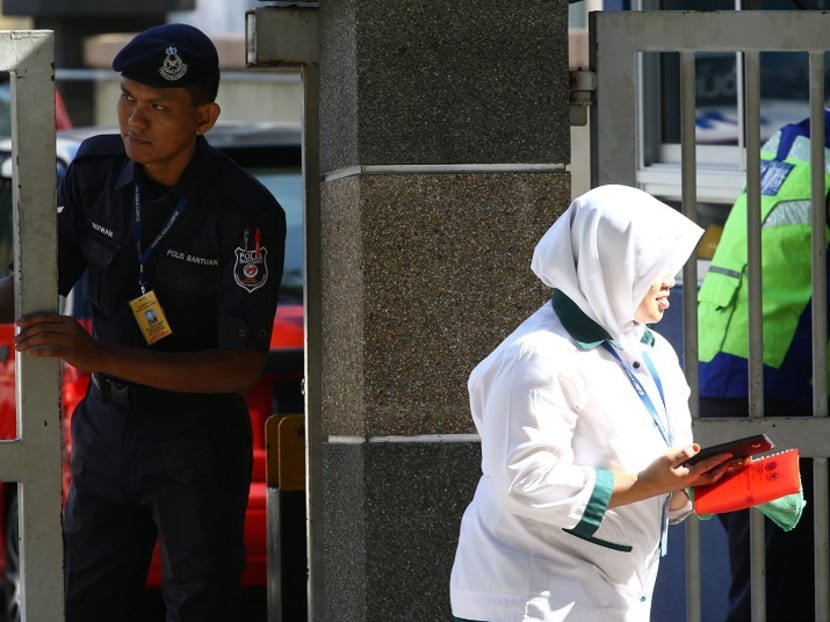Britain urges Malaysia to share evidence on VX attack
KUALA LUMPUR/NEW YORK — The Malaysian police will be prepared to share with the United Nations information pertaining to the VX nerve agent that caused the death of North Korean Kim Jong-nam in Malaysia, provided the Foreign Ministry gives permission, said the Inspector-General of Police Khalid Abu Bakar.

A police officer looks on as a hospital staff walks past outside the morgue at Kuala Lumpur General Hospital where Kim Jong-nam’s body is held. Photo: Reuters
KUALA LUMPUR/NEW YORK — The Malaysian police will be prepared to share with the United Nations information pertaining to the VX nerve agent that caused the death of North Korean Kim Jong-nam in Malaysia, provided the Foreign Ministry gives permission, said the Inspector-General of Police Khalid Abu Bakar.
“We are prepared to share information with the UN if Wisma Putra allows us to do so,” he told news agency Bernama on Tuesday (Feb 28).
On Monday, Britain had urged Malaysia to share evidence from the lethal VX nerve gas attack with the United Nations, which could take action against North Korea. British Ambassador Matthew Rycroft had said information on the Feb 13 attack at Kuala Lumpur airport that killed Kim Jong-nam should be sent to the Hague-based Organisation for the Prohibition of Chemical Weapons.
“If they have got evidence, they should send it to the OPCW and to the Security Council,” Mr Rycroft told journalists.
“Once they have done that, then we can take it forward.”
Mr Rycroft said he hoped that any country “in this case Malaysia, with potential evidence of something as serious as this, makes it available as soon as possible”.
Japanese Ambassador Koro Bessho said it was up to Malaysia to decide whether it wanted to pass on the information.
“We are basically waiting for Malaysia to come up with a clear-cut decision,” he added.
Asked whether the police were prepared to accept assistance from the UN in the investigation into Jong-nam’s murder, Mr Khalid said the police would consider the form of assistance before making a decision.
“Let’s see what kind of assistance is offered,” he said.
Malaysia is a signatory to the Chemical Weapons Convention, which seeks to eliminate the use of the toxic agents.
On Friday, the OPCW said in a statement that “the Malaysian authorities seem to have determined that the nerve agent VX was used in a killing at the airport on 13 February”.
“Any use of chemical weapons is deeply disturbing”, it said, adding that the OPCW was ready to offer expertise and technical assistance to Malaysia.
The Malaysian mission to the United Nations did not immediately return enquiries about its plans.
Earlier, a lecturer at the Chemistry Department of the Science Faculty, Universiti Teknologi Malaysia (UTM), Prof Dr Abdul Rahim Yacob, said there was no reason to doubt the investigation and analysis on the case by Malaysia’s chemists as their expertise is recognised worldwide.
He expressed confidence of the department’s capability to carry out an analysis of the chemical weapon.
Prof Abdul Rahim has more than 20 years of experience in Forensic science and had served as a chemist at the Department of Chemistry Malaysia for 10 years.
“We have sophisticated technology to detect poison and chemical residues such as High-performance liquid chromatography (HPLC) machine, UV Detector and Gas chromatography. So, there should not be any doubts,” he said when contacted by news agency Bernama.
Malaysia’s health minister said Sunday that Kim Jong-nam suffered a “very painful death”, with the nerve agent severely affecting his heart and lungs.
“From the time of the onset (of the attack) he died within 15 to 20 minutes,” Health Minister S. Subramaniam told reporters.
South Korea slammed the use of the toxin as a “blatant violation of the Chemical Weapons Convention and other international norms”.
North Korea, which has not signed the CWC, has already been hit with six sets of UN sanctions for carrying out nuclear tests and ballistic missile launches. AGENCIES






